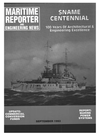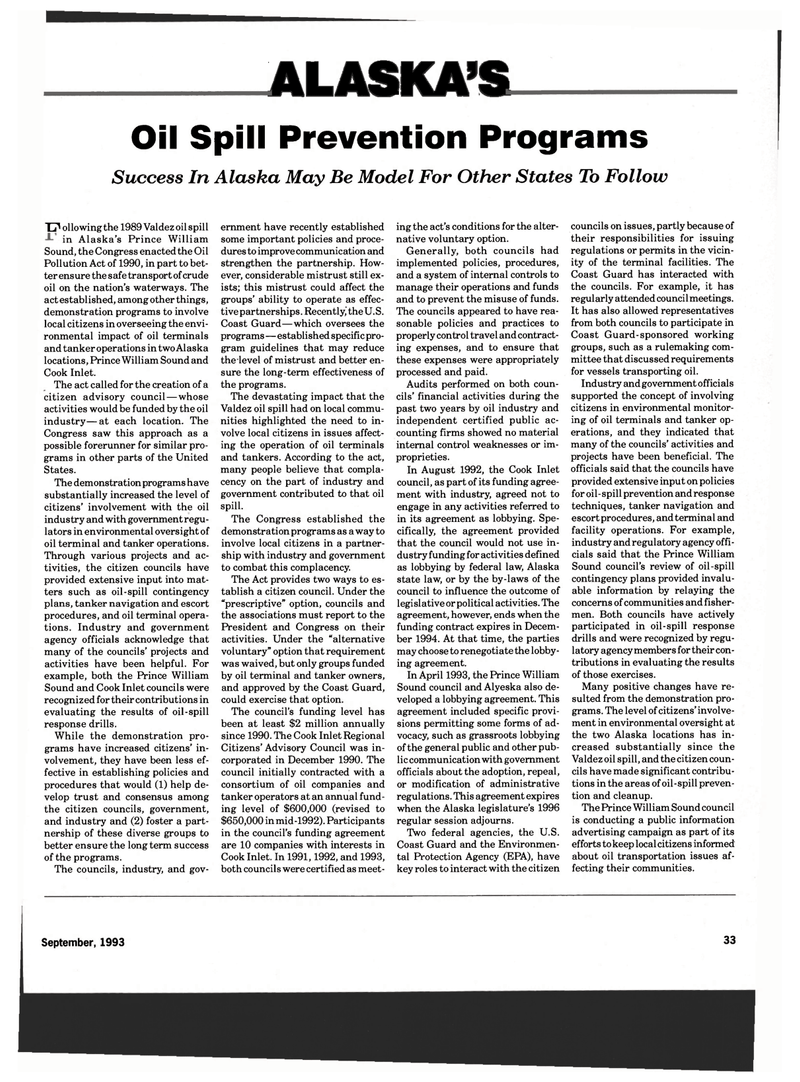
Page 31: of Maritime Reporter Magazine (September 1993)
Read this page in Pdf, Flash or Html5 edition of September 1993 Maritime Reporter Magazine
ALASKA'S
Oil Spill Prevention Programs
Success In Alaska May Be Model For Other States To Follow "CI ollowing the 1989 Valdez oil spill in Alaska's Prince William
Sound, the Congress enacted the Oil
Pollution Act of 1990, in part to bet- ter ensure the s afe transport of crude oil on the nation's waterways. The act established, among other things, demonstration programs to involve local citizens in overseeing the envi- ronmental impact of oil terminals and tanker operations in two Alaska locations, Prince William Sound and
Cook Inlet.
The act called for the creation of a citizen advisory council — whose activities would be funded by the oil industry—at each location. The
Congress saw this approach as a possible forerunner for similar pro- grams in other parts of the United
States.
The demonstration programs have substantially increased the level of citizens' involvement with the oil industry and with government regu- lators in environmental oversight of oil terminal and tanker operations.
Through various projects and ac- tivities, the citizen councils have provided extensive input into mat- ters such as oil-spill contingency plans, tanker navigation and escort procedures, and oil terminal opera- tions. Industry and government agency officials acknowledge that many of the councils' projects and activities have been helpful. For example, both the Prince William
Sound and Cook Inlet councils were recognized for their contributions in evaluating the results of oil-spill response drills.
While the demonstration pro- grams have increased citizens' in- volvement, they have been less ef- fective in establishing policies and procedures that would (1) help de- velop trust and consensus among the citizen councils, government, and industry and (2) foster a part- nership of these diverse groups to better ensure the long term success of the programs.
The councils, industry, and gov- ernment have recently established some important policies and proce- dures to improve communication and strengthen the partnership. How- ever, considerable mistrust still ex- ists; this mistrust could affect the groups' ability to operate as effec- tive partnerships. Recently,' the U.S.
Coast Guard—which oversees the programs—established specific pro- gram guidelines that may reduce the level of mistrust and better en- sure the long-term effectiveness of the programs.
The devastating impact that the
Valdez oil spill had on local commu- nities highlighted the need to in- volve local citizens in issues affect- ing the operation of oil terminals and tankers. According to the act, many people believe that compla- cency on the part of industry and government contributed to that oil spill.
The Congress established the demonstration programs as a way to involve local citizens in a partner- ship with industry and government to combat this complacency.
The Act provides two ways to es- tablish a citizen council. Under the "prescriptive" option, councils and the associations must report to the
President and Congress on their activities. Under the "alternative voluntary" option that requirement was waived, but only groups funded by oil terminal and tanker owners, and approved by the Coast Guard, could exercise that option.
The council's funding level has been at least $2 million annually since 1990. The Cook Inlet Regional
Citizens' Advisory Council was in- corporated in December 1990. The council initially contracted with a consortium of oil companies and tanker operators at an annual fund- ing level of $600,000 (revised to $650,000 in mid -1992). Participants in the council's funding agreement are 10 companies with interests in
Cook Inlet. In 1991,1992, and 1993, both councils were certified as meet- ing the act's conditions for the alter- native voluntary option.
Generally, both councils had implemented policies, procedures, and a system of internal controls to manage their operations and funds and to prevent the misuse of funds.
The councils appeared to have rea- sonable policies and practices to properly control travel and contract- ing expenses, and to ensure that these expenses were appropriately processed and paid.
Audits performed on both coun- cils' financial activities during the past two years by oil industry and independent certified public ac- counting firms showed no material internal control weaknesses or im- proprieties.
In August 1992, the Cook Inlet council, as part of its funding agree- ment with industry, agreed not to engage in any activities referred to in its agreement as lobbying. Spe- cifically, the agreement provided that the council would not use in- dustry funding for activities defined as lobbying by federal law, Alaska state law, or by the by-laws of the council to influence the outcome of legislative or political activities. The agreement, however, ends when the funding contract expires in Decem- ber 1994. At that time, the parties may choose to renegotiate the lobby- ing agreement.
In April 1993, the Prince William
Sound council and Alyeska also de- veloped a lobbying agreement. This agreement included specific provi- sions permitting some forms of ad- vocacy, such as grassroots lobbying of the general public and other pub- lic communication with government officials about the adoption, repeal, or modification of administrative regulations. This agreement expires when the Alaska legislature's 1996 regular session adjourns.
Two federal agencies, the U.S.
Coast Guard and the Environmen- tal Protection Agency (EPA), have key roles to interact with the citizen councils on issues, partly because of their responsibilities for issuing regulations or permits in the vicin- ity of the terminal facilities. The
Coast Guard has interacted with the councils. For example, it has regularly attended council meetings.
It has also allowed representatives from both councils to participate in
Coast Guard-sponsored working groups, such as a rulemaking com- mittee that discussed requirements for vessels transporting oil.
Industry and government officials supported the concept of involving citizens in environmental monitor- ing of oil terminals and tanker op- erations, and they indicated that many of the councils' activities and projects have been beneficial. The officials said that the councils have provided extensive input on policies for oil-spill prevention and response techniques, tanker navigation and escort procedures, and terminal and facility operations. For example, industry and regulatory agency offi- cials said that the Prince William
Sound council's review of oil-spill contingency plans provided invalu- able information by relaying the concerns of communities and fisher- men. Both councils have actively participated in oil-spill response drills and were recognized by regu- latory agency members for their con- tributions in evaluating the results of those exercises.
Many positive changes have re- sulted from the demonstration pro- grams. The level of citizens' involve- ment in environmental oversight at the two Alaska locations has in- creased substantially since the
Valdez oil spill, and the citizen coun- cils have made significant contribu- tions in the areas of oil-spill preven- tion and cleanup.
The Prince William Sound council is conducting a public information advertising campaign as part of its efforts to keep local citizens informed' about oil transportation issues af- fecting their communities.
September, 1993 33

 30
30

 32
32
